Canada's Huawei extradition ruling could unleash more Chinese backlash
OTTAWA (Reuters) - A Canadian court ruling that could permit the extradition of a senior Huawei Technologies Co Ltd [HWT.UL] executive to the United States leaves Canada vulnerable to further retaliation from Beijing, analysts said.
Huawei Technologies Chief Financial Officer Meng Wanzhou smiles as she leaves her home to attend a court hearing in Vancouver, British Columbia, Canada May 27, 2020. REUTERS/Jennifer Gauthier
Huawei Chief Financial Officer Meng Wanzhou on Wednesday lost a challenge to a U.S. bid to extradite her to face bank fraud charges, a decision the Chinese embassy in Ottawa strongly denounced.
For Canada, the stakes are high. After Meng’s arrest in Vancouver in December 2018, China detained two Canadian citizens on state security charges and blocked imports of some canola seed.
This month, China’s CanSino Biologics Inc began working with the country’s National Research Council to “pave the way” for future COVID-19 vaccine trials in Canada. China has been supplying the country with personal protection equipment during the outbreak.
“If China decides to cut us off from those kinds of things, people will die,” said Stephanie Carvin, an assistant professor and security expert at Ottawa’s Carleton University.
“My very strong concern is that cooperation goes away very quickly, and it leaves us in a very bad position,” she added.
Guy Saint-Jacques, a former Canadian ambassador to China, forecast Beijing would announce a trial date for the two Canadian citizens it is holding, as well as taking more punitive trade measures.
Chinese President “Xi Jinping will want to appear strong and will want to be seen as acting against Canada,” Saint-Jacques told the Canadian Broadcasting Corp.
Asked on Thursday if he feared Chinese backlash, Prime Minister Justin Trudeau did not answer. Instead, he noted that Canada’s judiciary system is independent, and renewed his call for immediate release of citizens Michael Kovrig and Michael Spavor.
“We will continue to defend our interests and our values,” Trudeau added.
“There are a lot of issues in play,” said Roland Paris, a former foreign policy adviser to Trudeau and professor of international affairs at University of Ottawa.
Managing relations with China is like “walking the razor’s edge,” he said.
“Our approach to China is one that is not naive and... we’re not afraid to take a strong line and a firm line when we need to,” said a government source in Ottawa, requesting anonymity given the sensitivity of the situation.
University of British Columbia professor Paul Evans predicted the two detainees would remain behind bars for some time.
The ruling “isn’t going to make life easier for the two Michaels,” he said.
China brands Canada ‘accomplice’ of US, as Huawei’s Meng Wanzhou loses bid to have extradition case thrown out
Canadian judge rules that the US fraud charges against Meng satisfy the ‘double criminality’ rule, and her extradition case must continue
China’s embassy blasts the ruling, accusing Canada of taking part in a ‘grave political incident’ and saying it should ‘not go further down the wrong path’

Ian Young in Vancouver, 28 May, 2020
VIDEO AT THE END
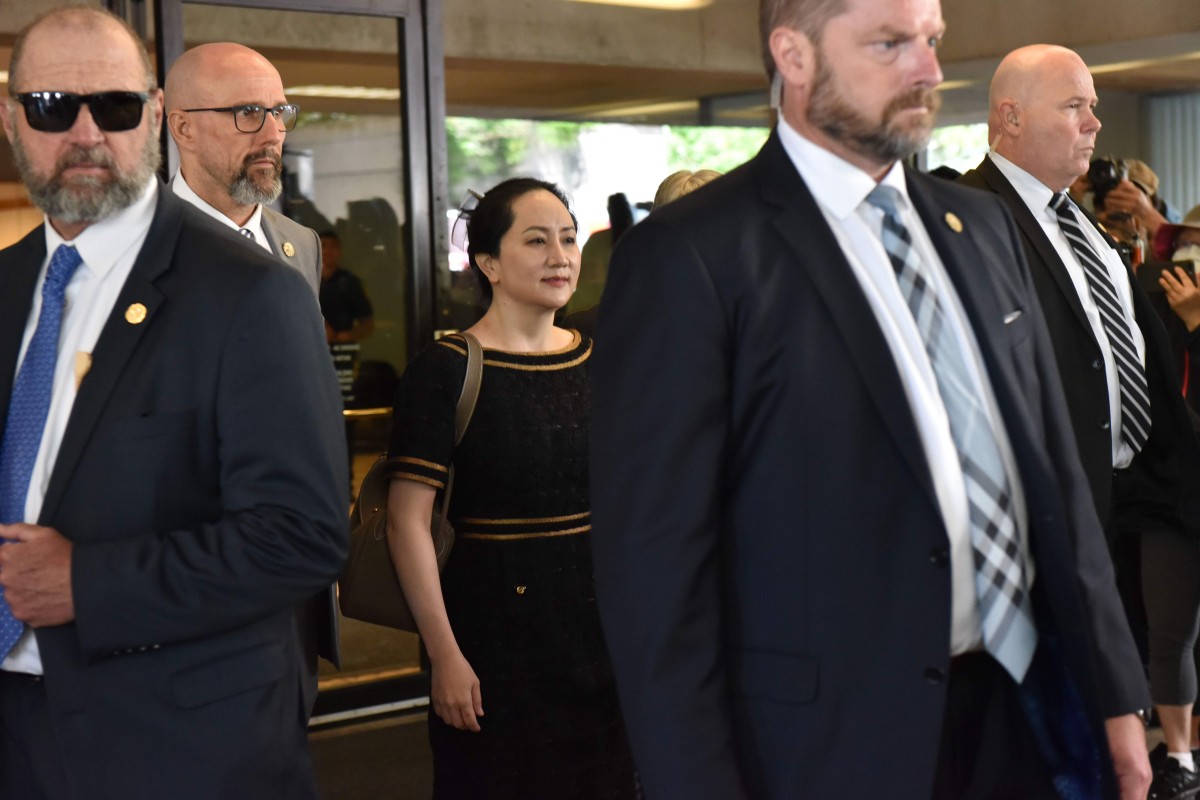
Huawei CFO Meng Wanzhou leaving court on Wednesday, after hearing the decision on her double-criminality application. Photo: AFP
China has accused Canada of acting as an “accomplice” to the United States in a “grave political incident”, after a judge in Vancouver rejected a bid by Huawei executive Meng Wanzhou to have her US extradition case thrown out.
Justice Heather Holmes of British Columbia’s Supreme Court ruled on Wednesday that the US fraud charges against Meng satisfied the Canadian extradition requirement of “double criminality”, which demands that suspects be accused of something that would constitute a crime in Canada as well as in the requesting country.
The extradition case – which has thrown China’s relations with Canada and the US into turmoil – will therefore continue.
“On the question of law posed, I conclude that, as a matter of law, the double criminality requirement for extradition is capable of being met in this case,” Associate Chief Justice Holmes wrote in her judgment.
In a statement on social media, China’s embassy said: “China hereby expresses strong dissatisfaction and firm opposition to this decision, and has made serious representations with Canada.”
“The United States and Canada, by abusing their bilateral extradition treaty and arbitrarily taking forceful measures against Ms Meng Wanzhou, gravely violated the lawful rights and interests of the said Chinese citizen,” the statement said.
“The purpose of the United States is to bring down Huawei and other Chinese high-tech companies, and Canada has been acting as an accomplice of the United States. The whole case is entirely a grave political incident.”
The statement urged Canada to “immediately release Ms Meng Wanzhou and allow her to return safely to China, and not go further down the wrong path”.
Canada’s Department of Justice had hailed “the independence of Canada’s extradition process”, in a statement after the ruling. Meng’s lawyers will continue to fight against her extradition on other grounds.
As for the question raised by the media concerning the Canadian court’s ruling on the so-called “double criminality” issue in the case of Chinese citizen Meng Wanzhou, the spokesperson of the Chinese Embassy made remarks as follows:
pic.twitter.com/BkhC6Yji60
— ChineseEmbassyOttawa (@ChinaEmbOttawa)
May 27, 2020
US prosecutors want Meng extradited from Canada to face trial in New York. Canadian police, acting at the request of US authorities, arrested her at Vancouver’s airport on December 1, 2018.
The arrest set off a diplomatic firestorm amid the US-China trade war and sent Beijing’s relations with Ottawa plummeting. Meng is accused of defrauding HSBC bank by deceiving an executive in Hong Kong about Huawei’s alleged business dealings in Iran, a breach of US sanctions.
Meng’s lawyers had tried to have the extradition case dismissed by arguing that the fraud charges were in fact a “dressed up” accusation that Meng had broken US sanctions, which is not a crime in Canada.
But Holmes said that the “essence” of Meng’s alleged wrongful conduct “is the making of intentionally false statements in the banker client relationship that put HSBC at risk”.
“The US sanctions are part of the state of affairs necessary to explain how HSBC was at risk, but they are not themselves an intrinsic part of the conduct,” wrote Holmes.
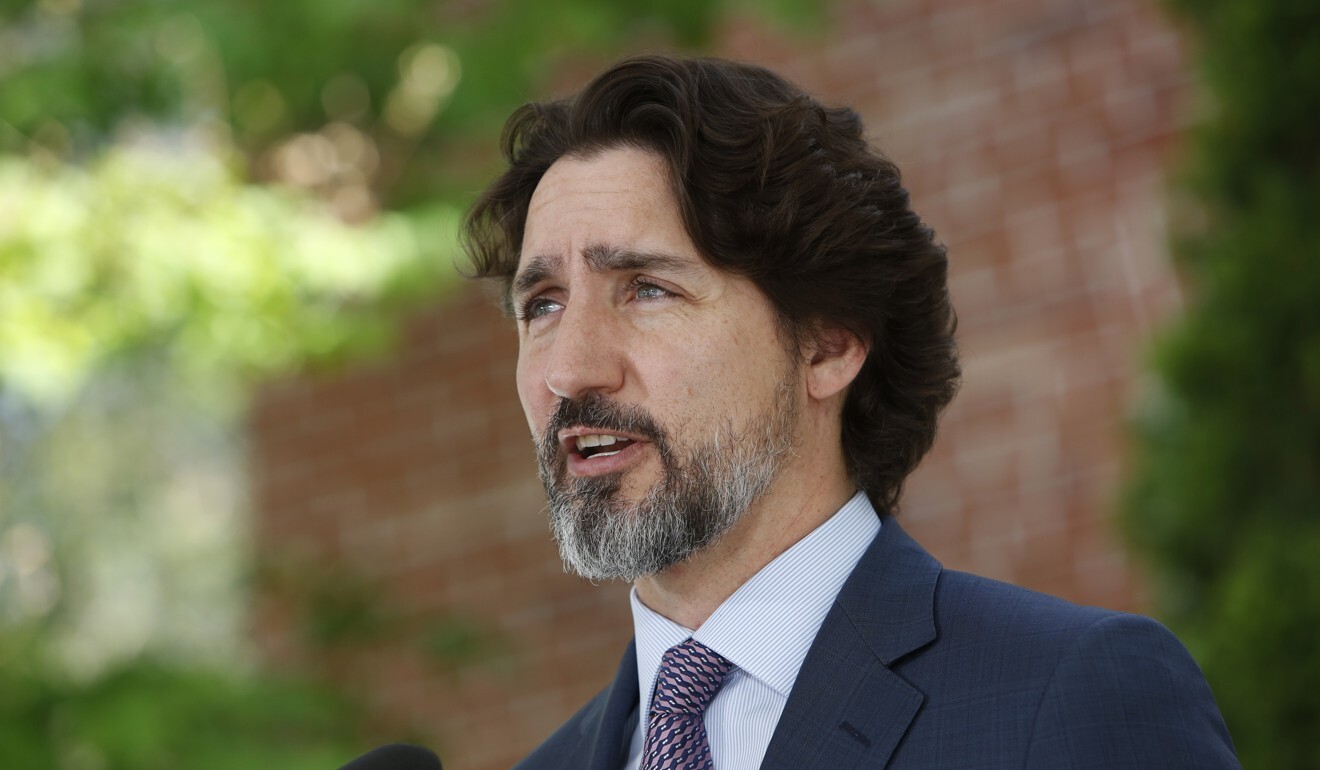
Although Canadian Prime Minister Justin Trudeau has emphasised that Canada’s courts are independent from political considerations, the latest Meng ruling could further strain Ottawa-Beijing relations. Photo: Bloomberg
“For this reason, I cannot agree with Ms Meng that to refer to US sanctions in order to understand the risk to HSBC is to allow the essence of the conduct to be defined by foreign law. Canada’s laws determine whether the alleged conduct, in its essence, amounts to fraud.”
Meng, 48, will remain under partial house arrest in Vancouver, where she lives in a C$13.6 million (US$9.9 million) mansion on C$10 million bail.
Holmes said that the double criminality analysis of Meng’s lawyers “would seriously limit Canada’s ability to fulfil its international obligations in the extradition context” regarding economic crimes, noting that “the offence of fraud has a vast potential scope”.
Meng’s ‘lies’ to HSBC are a clear case of fraud, Canadian lawyer says
17 Feb 2020


Canadian Prime Minister Justin Trudeau this week tried to emphasise that Canada’s courts are independent from political considerations. But the case has deeply strained relations between Ottawa and Beijing.
On Tuesday, China’s foreign ministry said Canada “should immediately correct its mistake, release Meng and ensure her safe return to China at an early date, so as to avoid any continuous harm to China-Canada relations”.
In the wake of Meng’s arrest, China detained two Canadians, Michael Kovrig and Michael Spavor, accusing them of espionage. But their treatment is widely viewed in Canada as hostage-taking, and retaliation for Meng’s arrest.
Holmes’ decision represents a major setback for Meng, who is the daughter of Huawei CEO Ren Zhengfei. However, her lawyers are continuing to contest extradition by arguing that her case has been tainted by political interference, such as when US President Donald Trump said in December 2018 that he might intervene in the case if it suited US economic interests.
Meng's lawyers have also said her Canadian rights were violated by her treatment at Vancouver’s airport, when border agents searched her belongings and questioned her in what they allege was a “covert criminal investigation” on behalf of the US FBI.
Holmes’ ruling outlined the US accusation that Meng gave “false assurances” about Huawei’s Iran business to a HSBC banker in the back room of a Hong Kong restaurant in 2013. These assurances allegedly put HSBC at economic and reputational risk by “significantly understating” Huawei’s relationship with Skycom, a company based in Iran.
Meng case embarrasses Canadian court, lawyer says, rejecting fraud claim
17 Feb 2020


Meng allegedly described Skycom as a partner. But although Huawei had sold its shareholdings in Skycom and Meng herself had resigned as a member of its board, “Huawei in reality continued to control Skycom and its banking and business operations in Iran”, wrote Holmes in her summary of the US case.
In her decision, Holmes said that although Canada did not have a sanctions regime against Iran, such US laws were “not fundamentally contrary to Canadian values in the way that slavery laws would be, for example”.
After Holmes’ ruling was released online, Meng appeared at a brief court hearing. Proceedings were adjourned until a case management conference on June 3.
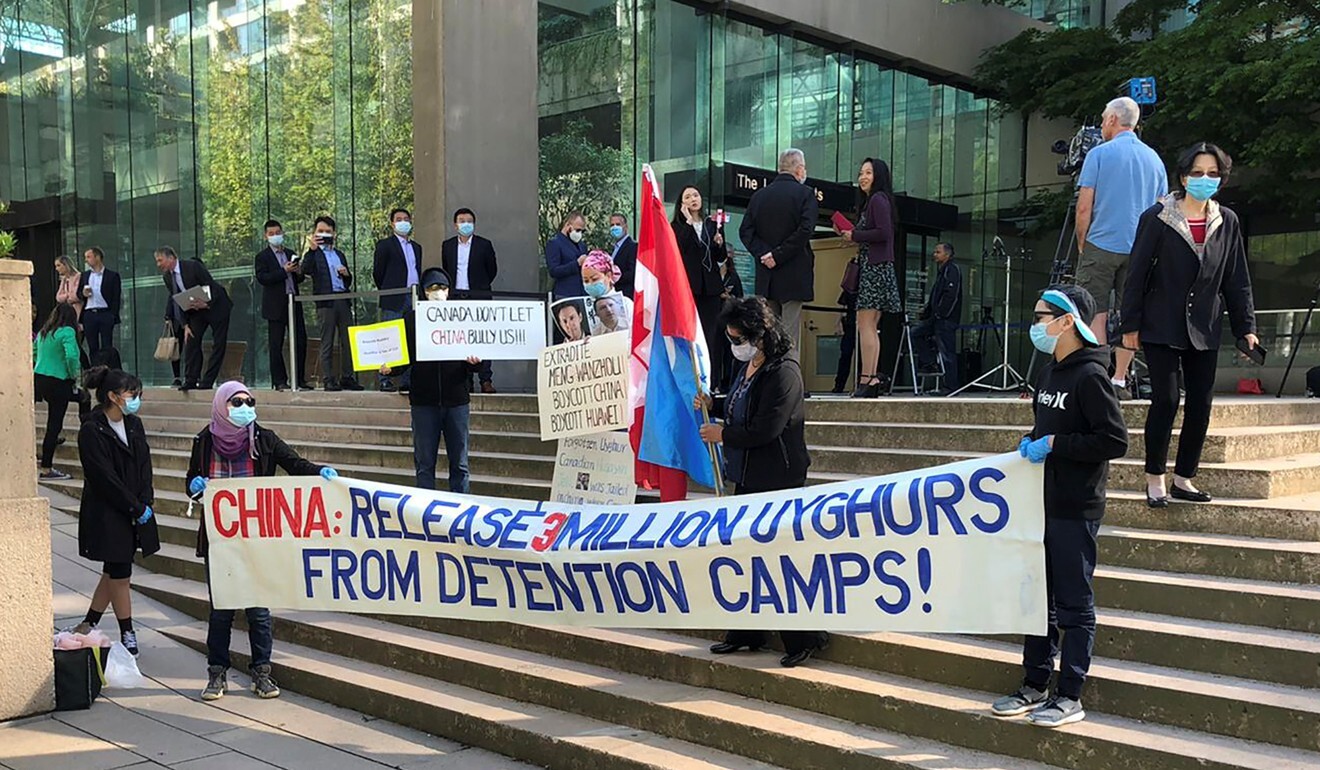
Protesters hold a banner before a court hearing attended by Huawei Technologies Chief Financial Officer Meng Wanzhou in Vancouver, British Columbia, on Wednesday. Photo: Reuters
Further hearings are scheduled until October, but appeals mean the extradition case could last years.
Huawei said in a statement that it was “disappointed” by Wednesday’s ruling.
“We expect that Canada’s judicial system will ultimately prove Ms Meng’s innocence,” the statement said.
However, the Canadian extradition hearings are not to determine Meng’s guilt or innocence, only whether the case meets a test for committal and she should be sent to the US to face trial.
Holmes’ ruling was released in stages: participating lawyers were emailed copies of the decision at 9am; Meng and Canadian and US authorities were allowed to be informed at 10am; then the ruling was finally made public at 11am.
There had been intense speculation about the ruling, heightened on Saturday when Meng was seen posing for photos on the steps of the Supreme Court in downtown Vancouver with about a dozen friends and Huawei colleagues.
Canada border officers subjected Meng to ‘chilling’ misconduct, lawyers say
25 Sep 2019

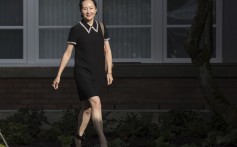
On Wednesday morning around 8am, four women who were among that group turned up at Meng’s mansion in the exclusive Vancouver neighbourhood of Shaughnessy, bustling past about two dozen waiting reporters.
Nine and 10 o’clock ticked past without the curtains at the house even flickering.
“We’re just waiting for the Navy Seals to come in,” joked a guard from Lion’s Gate Risk Management, pointing a thumb in the direction of the US consul-general’s residence, just a couple of doors from Meng’s house. The Lion’s Gate guards are tasked with preventing Meng from escaping, but also act as her de facto bodyguards. She pays their bills under the terms of her bail.
It would not be until 10.45am that Meng herself emerged from the house, greeting reporters before climbing into a black Chevrolet Suburban SUV and heading to court.
Canadian court rules against Huawei exec fighting extradition
Issued on: 28/05/2020
Vancouver (AFP)
An executive for Chinese tech giant Huawei suffered a legal setback Wednesday when a Canadian judge ruled that proceedings to extradite her to the United States will go ahead.
The decision on so-called double criminality, a key test for extradition, found that bank fraud accusations against Meng Wanzhou would stand up in Canada.
The interim ruling denying Meng's attempt to gain her freedom means she will continue to live in a Vancouver mansion under strict bail conditions while her case plays out.
It also effectively dashed hopes for a quick mending of Canada-China relations, which soured following her arrest on a US warrant in 2018 during a stopover in Vancouver.
"The double criminality requirement for extradition is capable of being met in this case," British Columbia Supreme Court Justice Heather Holmes said in her 23-page ruling.
"Ms. Meng's application is therefore dismissed," she added.
Prosecutors accused Meng of committing fraud by lying to a bank, in this case an American one. That is a crime in both Canada and the United States.
Outside the courthouse, protestors held placards that read "Extradite Meng Wanzhou," "No Huawei in Canada" and "Canada don't let China bully us."
Inside, Meng was composed as the judge explained her decision, in contrast to a gleeful thumbs up the "Huawei Princess" had given while posing for pictures with family and friends on the steps of the courthouse days earlier.
Huawei said in a statement it was "disappointed" by the ruling, adding that it looked forward to Meng ultimately being exonerated.
- 'Grave political incident' -
China's Embassy in Ottawa, meanwhile, accused the United States of trying "to bring down Huawei" and Canada of being "an accomplice."
"The whole case is entirely a grave political incident," it said in a statement.
"We once again urge Canada to take China's solemn position and concerns seriously, immediately release Ms. Meng Wanzhou to allow her to return safely to China, and not to go further down the wrong path."
Beijing has long signaled that her repatriation was a precondition for improved bilateral ties and its release of two Canadians detained on espionage suspicions.
The arrests of former Canadian diplomat Michael Kovrig and businessman Michael Spavor nine days after Meng was taken into custody have been widely decried as retribution.
While the eldest daughter of Huawei founder Ren Zhengfei has been out on bail, the two Canadians remain in China's opaque penal system.
China has also blocked billions of dollars' worth of Canadian agricultural exports.
Prime Minister Justin Trudeau has insisted on leaving it to the courts to decide Meng's fate.
He lamented last week that communist-led China "doesn't seem to understand" the meaning of an independent judiciary.
On Wednesday his foreign minister, Francois-Philippe Champagne, said Canada would "continue to pursue principled engagement with China to address our bilateral differences and to cooperate in areas of mutual interest."
He also said Ottawa would continue to press for the release of Kovrig and Spavor, "who have been arbitrarily detained for over 500 days," and for clemency for a third Canadian, Robert Schellenberg, facing execution.
- Iran sanctions -
During four days of hearings in January, the court heard that Meng lied to the HSBC bank about Huawei's relationship with its own Iran-based affiliate Skycom in order to secure nearly US$1 billion in loans and credit, putting the bank at risk of violating US sanctions.
Lawyers for Canada's attorney general on behalf of the US Justice Department pointed to a 2013 presentation in Hong Kong in which she told HSBC executives that Huawei no longer owned Skycom and that she had resigned from its board.
The Crown called this a deception, asserting that Huawei controlled the operations of Skycom in Iran and held its purse strings.
"Lying to a bank to obtain financial services is fraud," Crown counsel Robert Frater told the court.
Defense lawyer Eric Gottardi accused the US of abusing its treaty with Canada by asking it to arrest Meng as part of a campaign against China's largest international company and leader in 5G, or fifth-generation wireless technologies.
The court, however, dismissed defense arguments that the case hinged on the US sanctions against Iran that Canada had repudiated.
"The essence of the alleged wrongful conduct in this case is the making of intentionally false statements in the banker client relationship that put HSBC at risk," Holmes wrote.
"The US sanctions are part of the state of affairs necessary to explain how HSBC was at risk, but they are not themselves an intrinsic part of the conduct."
Holmes noted that her ruling in no way makes a determination on whether there is sufficient evidence to justify extradition.
That question will be decided at a later stage in the proceedings.
The case now continues to a second phase, yet to be scheduled, when the defense will challenge the lawfulness of her arrest, followed by more hearings likely in September.
Any appeals could further drag it out for years.
© 2020 AFP
Canada court ruling allows US extradition case of Huawei executive to proceed
Decision says Meng Wanzhou’s alleged actions in the US would be considered a crime in Canada, a key condition for extradition
Leyland Cecco in Toronto THE GUARDIAN Wed 27 May 2020
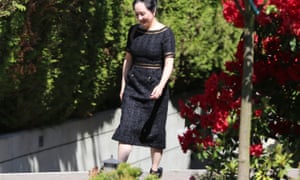
“The US sanctions are part of the state of affairs necessary to explain how HSBC was at risk, but they are not themselves an intrinsic part of the conduct,” wrote Holmes.

Although Canadian Prime Minister Justin Trudeau has emphasised that Canada’s courts are independent from political considerations, the latest Meng ruling could further strain Ottawa-Beijing relations. Photo: Bloomberg
“For this reason, I cannot agree with Ms Meng that to refer to US sanctions in order to understand the risk to HSBC is to allow the essence of the conduct to be defined by foreign law. Canada’s laws determine whether the alleged conduct, in its essence, amounts to fraud.”
Meng, 48, will remain under partial house arrest in Vancouver, where she lives in a C$13.6 million (US$9.9 million) mansion on C$10 million bail.
Holmes said that the double criminality analysis of Meng’s lawyers “would seriously limit Canada’s ability to fulfil its international obligations in the extradition context” regarding economic crimes, noting that “the offence of fraud has a vast potential scope”.
Meng’s ‘lies’ to HSBC are a clear case of fraud, Canadian lawyer says
17 Feb 2020

Canadian Prime Minister Justin Trudeau this week tried to emphasise that Canada’s courts are independent from political considerations. But the case has deeply strained relations between Ottawa and Beijing.
On Tuesday, China’s foreign ministry said Canada “should immediately correct its mistake, release Meng and ensure her safe return to China at an early date, so as to avoid any continuous harm to China-Canada relations”.
In the wake of Meng’s arrest, China detained two Canadians, Michael Kovrig and Michael Spavor, accusing them of espionage. But their treatment is widely viewed in Canada as hostage-taking, and retaliation for Meng’s arrest.
Holmes’ decision represents a major setback for Meng, who is the daughter of Huawei CEO Ren Zhengfei. However, her lawyers are continuing to contest extradition by arguing that her case has been tainted by political interference, such as when US President Donald Trump said in December 2018 that he might intervene in the case if it suited US economic interests.
Meng's lawyers have also said her Canadian rights were violated by her treatment at Vancouver’s airport, when border agents searched her belongings and questioned her in what they allege was a “covert criminal investigation” on behalf of the US FBI.
Holmes’ ruling outlined the US accusation that Meng gave “false assurances” about Huawei’s Iran business to a HSBC banker in the back room of a Hong Kong restaurant in 2013. These assurances allegedly put HSBC at economic and reputational risk by “significantly understating” Huawei’s relationship with Skycom, a company based in Iran.
Meng case embarrasses Canadian court, lawyer says, rejecting fraud claim
17 Feb 2020

Meng allegedly described Skycom as a partner. But although Huawei had sold its shareholdings in Skycom and Meng herself had resigned as a member of its board, “Huawei in reality continued to control Skycom and its banking and business operations in Iran”, wrote Holmes in her summary of the US case.
In her decision, Holmes said that although Canada did not have a sanctions regime against Iran, such US laws were “not fundamentally contrary to Canadian values in the way that slavery laws would be, for example”.
After Holmes’ ruling was released online, Meng appeared at a brief court hearing. Proceedings were adjourned until a case management conference on June 3.

Protesters hold a banner before a court hearing attended by Huawei Technologies Chief Financial Officer Meng Wanzhou in Vancouver, British Columbia, on Wednesday. Photo: Reuters
Further hearings are scheduled until October, but appeals mean the extradition case could last years.
Huawei said in a statement that it was “disappointed” by Wednesday’s ruling.
“We expect that Canada’s judicial system will ultimately prove Ms Meng’s innocence,” the statement said.
However, the Canadian extradition hearings are not to determine Meng’s guilt or innocence, only whether the case meets a test for committal and she should be sent to the US to face trial.
Holmes’ ruling was released in stages: participating lawyers were emailed copies of the decision at 9am; Meng and Canadian and US authorities were allowed to be informed at 10am; then the ruling was finally made public at 11am.
There had been intense speculation about the ruling, heightened on Saturday when Meng was seen posing for photos on the steps of the Supreme Court in downtown Vancouver with about a dozen friends and Huawei colleagues.
Canada border officers subjected Meng to ‘chilling’ misconduct, lawyers say
25 Sep 2019

On Wednesday morning around 8am, four women who were among that group turned up at Meng’s mansion in the exclusive Vancouver neighbourhood of Shaughnessy, bustling past about two dozen waiting reporters.
Nine and 10 o’clock ticked past without the curtains at the house even flickering.
“We’re just waiting for the Navy Seals to come in,” joked a guard from Lion’s Gate Risk Management, pointing a thumb in the direction of the US consul-general’s residence, just a couple of doors from Meng’s house. The Lion’s Gate guards are tasked with preventing Meng from escaping, but also act as her de facto bodyguards. She pays their bills under the terms of her bail.
It would not be until 10.45am that Meng herself emerged from the house, greeting reporters before climbing into a black Chevrolet Suburban SUV and heading to court.
Canadian court rules against Huawei exec fighting extradition
Issued on: 28/05/2020
Vancouver (AFP)
An executive for Chinese tech giant Huawei suffered a legal setback Wednesday when a Canadian judge ruled that proceedings to extradite her to the United States will go ahead.
The decision on so-called double criminality, a key test for extradition, found that bank fraud accusations against Meng Wanzhou would stand up in Canada.
The interim ruling denying Meng's attempt to gain her freedom means she will continue to live in a Vancouver mansion under strict bail conditions while her case plays out.
It also effectively dashed hopes for a quick mending of Canada-China relations, which soured following her arrest on a US warrant in 2018 during a stopover in Vancouver.
"The double criminality requirement for extradition is capable of being met in this case," British Columbia Supreme Court Justice Heather Holmes said in her 23-page ruling.
"Ms. Meng's application is therefore dismissed," she added.
Prosecutors accused Meng of committing fraud by lying to a bank, in this case an American one. That is a crime in both Canada and the United States.
Outside the courthouse, protestors held placards that read "Extradite Meng Wanzhou," "No Huawei in Canada" and "Canada don't let China bully us."
Inside, Meng was composed as the judge explained her decision, in contrast to a gleeful thumbs up the "Huawei Princess" had given while posing for pictures with family and friends on the steps of the courthouse days earlier.
Huawei said in a statement it was "disappointed" by the ruling, adding that it looked forward to Meng ultimately being exonerated.
- 'Grave political incident' -
China's Embassy in Ottawa, meanwhile, accused the United States of trying "to bring down Huawei" and Canada of being "an accomplice."
"The whole case is entirely a grave political incident," it said in a statement.
"We once again urge Canada to take China's solemn position and concerns seriously, immediately release Ms. Meng Wanzhou to allow her to return safely to China, and not to go further down the wrong path."
Beijing has long signaled that her repatriation was a precondition for improved bilateral ties and its release of two Canadians detained on espionage suspicions.
The arrests of former Canadian diplomat Michael Kovrig and businessman Michael Spavor nine days after Meng was taken into custody have been widely decried as retribution.
While the eldest daughter of Huawei founder Ren Zhengfei has been out on bail, the two Canadians remain in China's opaque penal system.
China has also blocked billions of dollars' worth of Canadian agricultural exports.
Prime Minister Justin Trudeau has insisted on leaving it to the courts to decide Meng's fate.
He lamented last week that communist-led China "doesn't seem to understand" the meaning of an independent judiciary.
On Wednesday his foreign minister, Francois-Philippe Champagne, said Canada would "continue to pursue principled engagement with China to address our bilateral differences and to cooperate in areas of mutual interest."
He also said Ottawa would continue to press for the release of Kovrig and Spavor, "who have been arbitrarily detained for over 500 days," and for clemency for a third Canadian, Robert Schellenberg, facing execution.
- Iran sanctions -
During four days of hearings in January, the court heard that Meng lied to the HSBC bank about Huawei's relationship with its own Iran-based affiliate Skycom in order to secure nearly US$1 billion in loans and credit, putting the bank at risk of violating US sanctions.
Lawyers for Canada's attorney general on behalf of the US Justice Department pointed to a 2013 presentation in Hong Kong in which she told HSBC executives that Huawei no longer owned Skycom and that she had resigned from its board.
The Crown called this a deception, asserting that Huawei controlled the operations of Skycom in Iran and held its purse strings.
"Lying to a bank to obtain financial services is fraud," Crown counsel Robert Frater told the court.
Defense lawyer Eric Gottardi accused the US of abusing its treaty with Canada by asking it to arrest Meng as part of a campaign against China's largest international company and leader in 5G, or fifth-generation wireless technologies.
The court, however, dismissed defense arguments that the case hinged on the US sanctions against Iran that Canada had repudiated.
"The essence of the alleged wrongful conduct in this case is the making of intentionally false statements in the banker client relationship that put HSBC at risk," Holmes wrote.
"The US sanctions are part of the state of affairs necessary to explain how HSBC was at risk, but they are not themselves an intrinsic part of the conduct."
Holmes noted that her ruling in no way makes a determination on whether there is sufficient evidence to justify extradition.
That question will be decided at a later stage in the proceedings.
The case now continues to a second phase, yet to be scheduled, when the defense will challenge the lawfulness of her arrest, followed by more hearings likely in September.
Any appeals could further drag it out for years.
© 2020 AFP
Canada court ruling allows US extradition case of Huawei executive to proceed
Decision says Meng Wanzhou’s alleged actions in the US would be considered a crime in Canada, a key condition for extradition
Leyland Cecco in Toronto THE GUARDIAN Wed 27 May 2020

Following the ruling, Meng Wanzhou will have to continue living under house arrest in Vancouver, where she owns two homes. Photograph: Anadolu Agency/Getty Images
A Canadian judge has dealt a major blow to a senior Huawei executive’s attempts to evade extradition to the United States, ruling that the high-profile case against Meng Wanzhou can proceed.
The British Columbia supreme court justice Heather Holmes ruled on Wednesday that the alleged actions of Meng would be considered a crime in Canada – a key condition for extradition to proceed.
The decision, is likely to be applauded by American officials, but will further strain relations between Canada and China, which have deteriorated significantly since Meng’s arrest in December 2018.
Meng was detained on a US warrant during a flight stopover at Vancouver airport, and the ensuing spat between the United States and China has left Canada taking collateral damage in the form of punitive trade measures and the retaliatory detention of Canadian citizens in China.
US prosecutors argue that Meng committed fraud when she lied about links between Huawei and a shell company used to sell telecommunications equipment to Iran in breach of US sanctions.
At issue in Wednesday’s ruling was the question of “double criminality” – whether Meng’s alleged actions in the United States would be considered a crime in Canada.
Canadian government lawyers argued that Meng lied about her company’s dealings with Iran when speaking to prospective investors at large banks, potentially putting them at risk of breaching the US sanctions. This deception, they said, amounted to fraud.
In her ruling, Justice Holmes concurred, finding that the “essence of the alleged wrongful conduct” lay in the deliberate attempts to misled bankers. She also determined that while the alleged attempt to evade American sanctions on Iran could have harmed the bank, the act was not a central component of the offense.
Meng’s legal team had argued that her behaviour did not amount to fraud, and that Canada did not have the same sanctions against Iran.
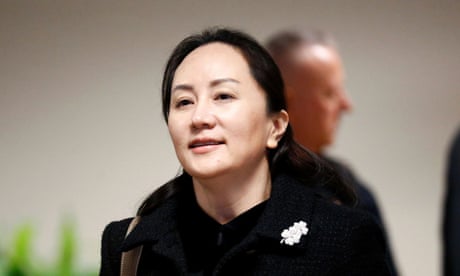
US case against Huawei's Meng Wanzhou is 'fiction', say lawyers
https://www.theguardian.com/technology/2020/jan/21/us-case-against-huaweis-meng-wanzhou-is-fiction-say-lawyers
Her lawyers are expected to appeal against the ruling, but the case will now probably enter its next stage, in which the defence will argue that US and Canadian authorities conspired against Meng.
The Huawei executive’s lawyers argue that her rights were breached by Canadian border guards who detained her for hours before her arrest by the Royal Canadian Mounted Police.
By opening multiple legal fronts, Meng’s team has all but ensured the tussle will last for years, with many experts believing the case is inevitably bound for the supreme court of Canada.
Following the ruling, Meng will have to continue living under house arrest in Vancouver, where she owns two homes. While under a curfew and required to wear a GPS tracking device, she is nonetheless able to travel freely around the city. Over the weekend, she was photographed by a CBC News reporter, standing outside the provincial courthouse, smiling and posing for pictures with friends and family.
China’s embassy in Ottawa accused the US and Canada of “abusing their bilateral extradition treaty and arbitrarily taking forceful measures” against Meng. In a statement it said her lawful rights and interests had been “gravely violated”.
“The purpose of the United States is to bring down Huawei and other Chinese high-tech companies, and Canada has been acting in the process as an accomplice of the United States,” it said.
Ahead of the verdict, China’s foreign minister, Zhao Lijan, called the case against Meng a “serious political incident” that had violated her rights.
“The Canadian side should correct its mistake, immediately release Ms Meng and ensure her safe return to China so as to avoid any continuous harm to China-Canada relations,” he said during a press conference on Tuesday.
In a statement posted on Twitter, Huawei said it was “disappointed” in the ruling, adding that it stood with Meng in “her pursuit for justice and freedom”.
“We expect that Canada’s judicial system will ultimately prove Ms Meng’s innocence. Ms Meng’s lawyers will continue to work tirelessly to see justice is served,” the statement said.
Justin Trudeau has warned against Chinese allegations that the case is politically motivated.
“Canada has an independent judicial system that functions without interference or override by politicians,” the prime minister said last week. “China doesn’t work quite the same way and doesn’t seem to understand that.”
Meng’s verdict comes amid growing frustration in Canada over the continued detention of Michael Kovrig and Michael Spavor, two Canadians who were seized in China shortly after Meng’s arrest.
A Canadian judge has dealt a major blow to a senior Huawei executive’s attempts to evade extradition to the United States, ruling that the high-profile case against Meng Wanzhou can proceed.
The British Columbia supreme court justice Heather Holmes ruled on Wednesday that the alleged actions of Meng would be considered a crime in Canada – a key condition for extradition to proceed.
The decision, is likely to be applauded by American officials, but will further strain relations between Canada and China, which have deteriorated significantly since Meng’s arrest in December 2018.
Meng was detained on a US warrant during a flight stopover at Vancouver airport, and the ensuing spat between the United States and China has left Canada taking collateral damage in the form of punitive trade measures and the retaliatory detention of Canadian citizens in China.
US prosecutors argue that Meng committed fraud when she lied about links between Huawei and a shell company used to sell telecommunications equipment to Iran in breach of US sanctions.
At issue in Wednesday’s ruling was the question of “double criminality” – whether Meng’s alleged actions in the United States would be considered a crime in Canada.
Canadian government lawyers argued that Meng lied about her company’s dealings with Iran when speaking to prospective investors at large banks, potentially putting them at risk of breaching the US sanctions. This deception, they said, amounted to fraud.
In her ruling, Justice Holmes concurred, finding that the “essence of the alleged wrongful conduct” lay in the deliberate attempts to misled bankers. She also determined that while the alleged attempt to evade American sanctions on Iran could have harmed the bank, the act was not a central component of the offense.
Meng’s legal team had argued that her behaviour did not amount to fraud, and that Canada did not have the same sanctions against Iran.

US case against Huawei's Meng Wanzhou is 'fiction', say lawyers
https://www.theguardian.com/technology/2020/jan/21/us-case-against-huaweis-meng-wanzhou-is-fiction-say-lawyers
Her lawyers are expected to appeal against the ruling, but the case will now probably enter its next stage, in which the defence will argue that US and Canadian authorities conspired against Meng.
The Huawei executive’s lawyers argue that her rights were breached by Canadian border guards who detained her for hours before her arrest by the Royal Canadian Mounted Police.
By opening multiple legal fronts, Meng’s team has all but ensured the tussle will last for years, with many experts believing the case is inevitably bound for the supreme court of Canada.
Following the ruling, Meng will have to continue living under house arrest in Vancouver, where she owns two homes. While under a curfew and required to wear a GPS tracking device, she is nonetheless able to travel freely around the city. Over the weekend, she was photographed by a CBC News reporter, standing outside the provincial courthouse, smiling and posing for pictures with friends and family.
China’s embassy in Ottawa accused the US and Canada of “abusing their bilateral extradition treaty and arbitrarily taking forceful measures” against Meng. In a statement it said her lawful rights and interests had been “gravely violated”.
“The purpose of the United States is to bring down Huawei and other Chinese high-tech companies, and Canada has been acting in the process as an accomplice of the United States,” it said.
Ahead of the verdict, China’s foreign minister, Zhao Lijan, called the case against Meng a “serious political incident” that had violated her rights.
“The Canadian side should correct its mistake, immediately release Ms Meng and ensure her safe return to China so as to avoid any continuous harm to China-Canada relations,” he said during a press conference on Tuesday.
In a statement posted on Twitter, Huawei said it was “disappointed” in the ruling, adding that it stood with Meng in “her pursuit for justice and freedom”.
“We expect that Canada’s judicial system will ultimately prove Ms Meng’s innocence. Ms Meng’s lawyers will continue to work tirelessly to see justice is served,” the statement said.
Justin Trudeau has warned against Chinese allegations that the case is politically motivated.
“Canada has an independent judicial system that functions without interference or override by politicians,” the prime minister said last week. “China doesn’t work quite the same way and doesn’t seem to understand that.”
Meng’s verdict comes amid growing frustration in Canada over the continued detention of Michael Kovrig and Michael Spavor, two Canadians who were seized in China shortly after Meng’s arrest.
No comments:
Post a Comment